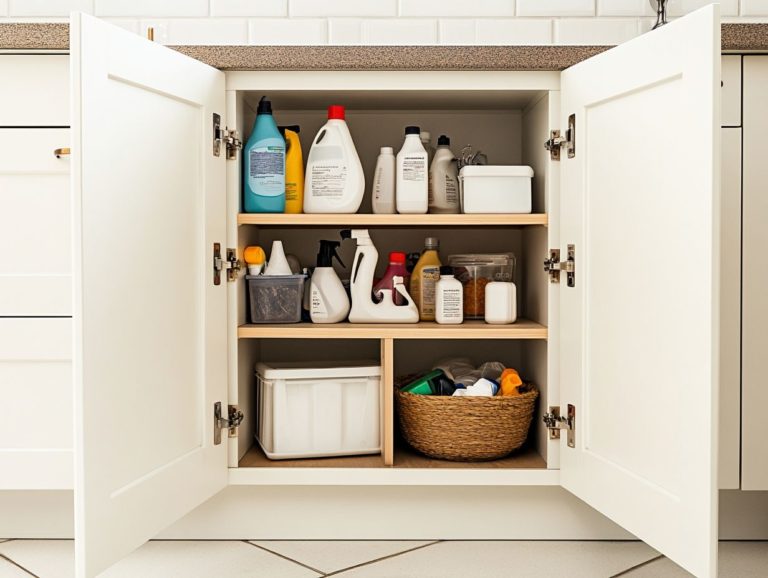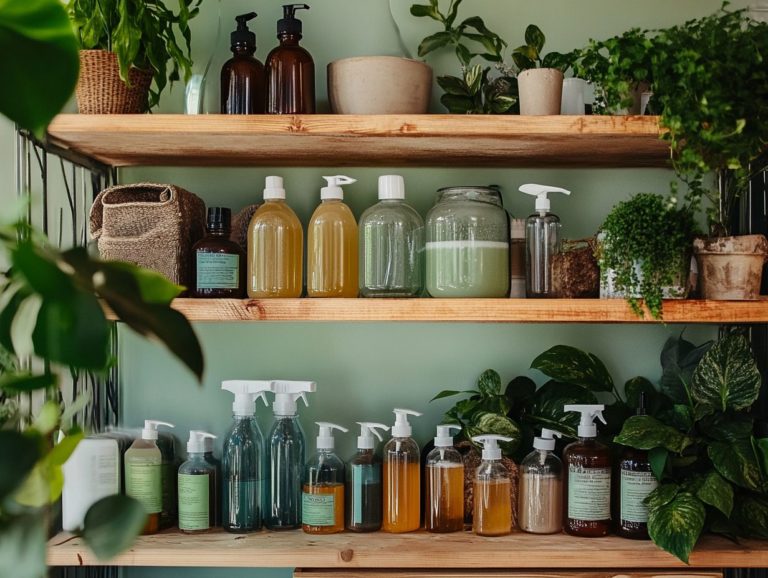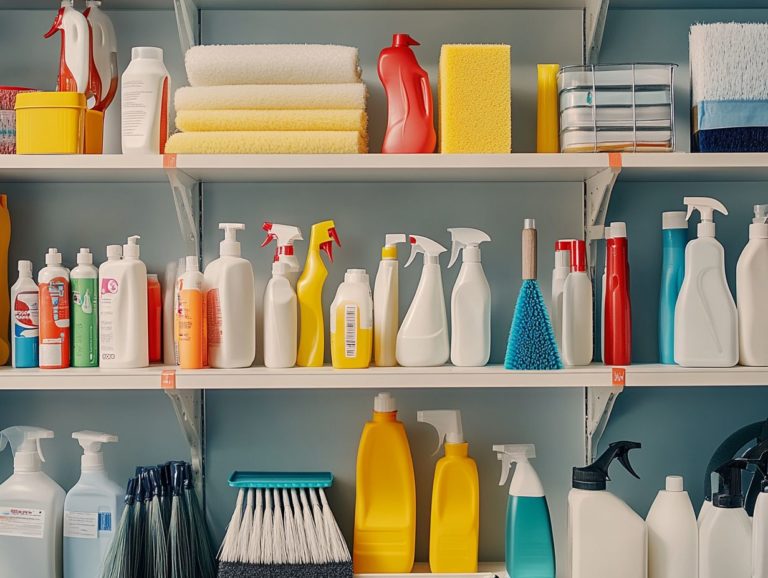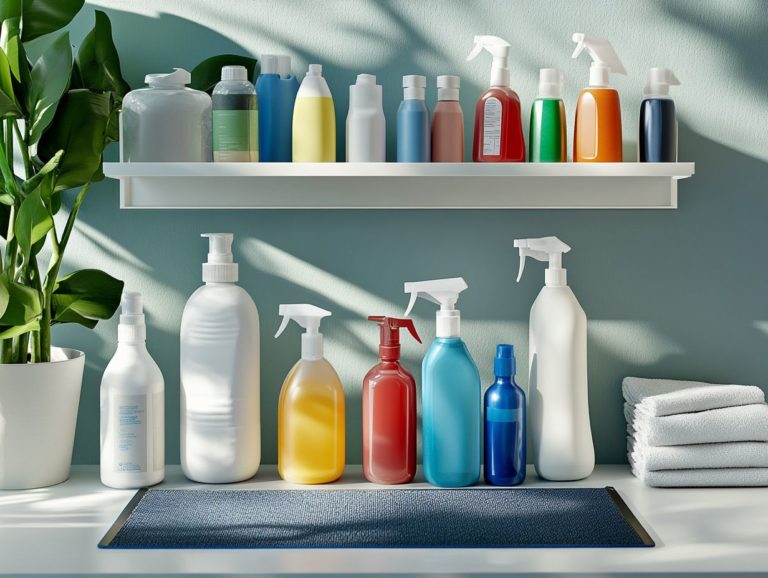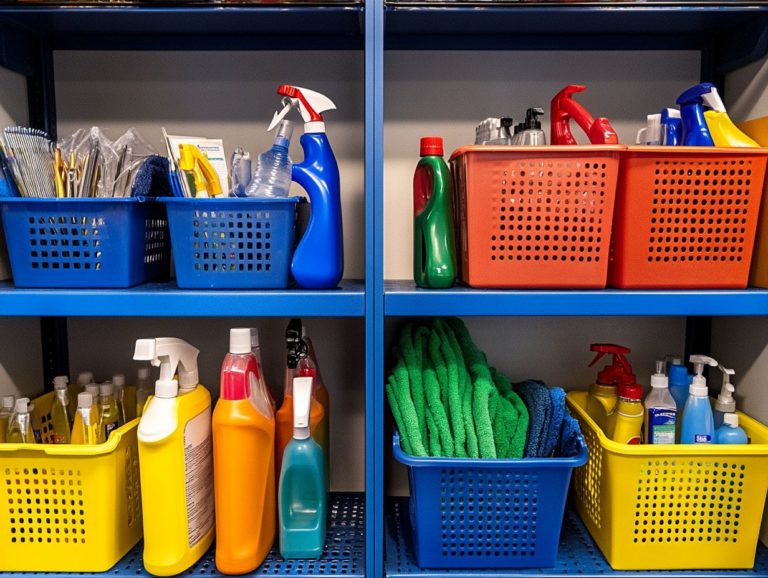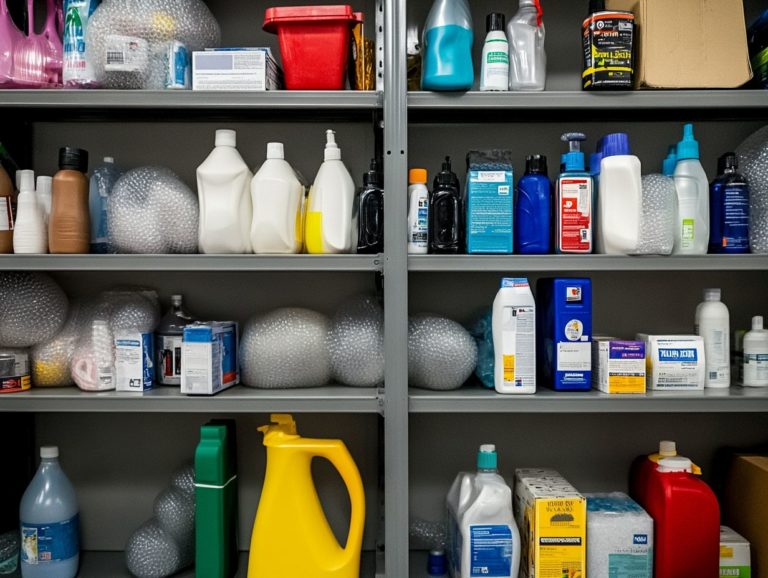Choosing the Right Containers for Cleaners
When it comes to storing your cleaners, the choice of container is paramount for preserving both their efficacy and safety.
This article delves into the different types of containers at your disposal plastic, glass, and metal illuminating their distinct advantages and disadvantages. Whether your goal is to optimize storage or ensure the longevity of your cleaning products, understanding the right container to suit your specific needs is essential.
You ll find guidance on the factors to consider, along with tips for proper maintenance to keep your cleaning supplies in prime condition.
Contents
- Key Takeaways:
- Plastic Containers
- Glass Containers
- Metal Containers
- Choosing the Right Container for Your Specific Cleaner
- Proper Storage and Maintenance of Containers
- Frequently Asked Questions
- What factors should I consider when choosing the right containers for cleaners?
- What type of cleaner is best stored in a spray bottle?
- Can I use any type of container to store my cleaners?
- What material is best for storing household chemicals and cleaning products?
- Is it important to label my cleaner containers for proper inventory management?
- How should I store my cleaner containers to comply with OSHA regulations?
Key Takeaways:
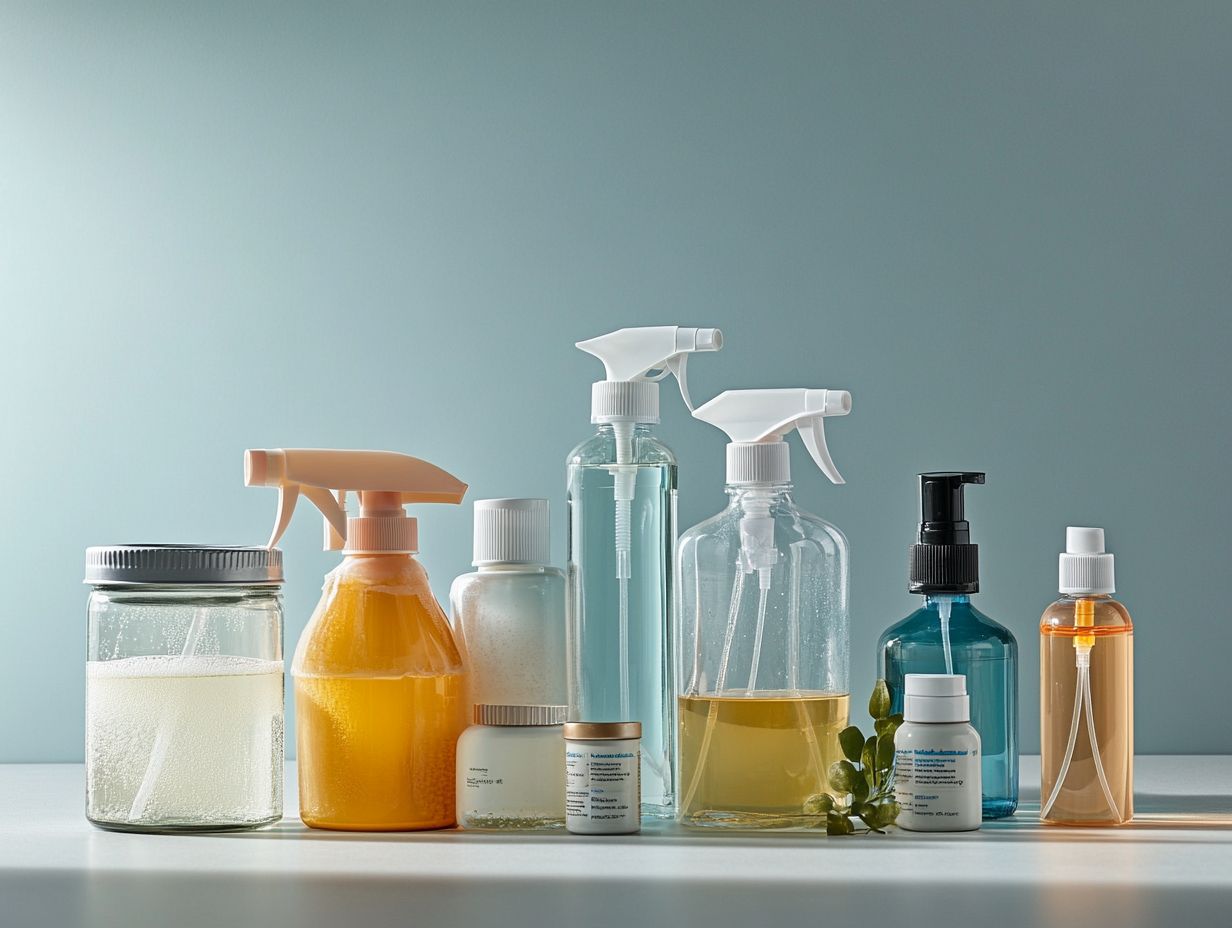
- Plastic containers offer affordability and versatility but may not be suitable for all types of cleaners due to potential chemical reactions.
- Glass containers are great for natural or harsh cleaners, as they are non-reactive and can be easily cleaned and reused.
- Metal containers are durable and can withstand harsh chemicals but may be more expensive and prone to rusting if not properly maintained.
Plastic Containers
Plastic containers serve as versatile storage solutions that you can utilize in various settings, from home organization projects to industrial applications. Available in an array of shapes and sizes, these containers are specifically designed to meet different needs, whether you re storing cleaning supplies, organizing inventory, or handling hazardous waste.
Understand the types and regulations associated with plastic containers, including FDA guidelines, to ensure compatibility and safety in their usage. Effective color coding can enhance your organizational efforts and simplify inventory management.
This makes plastic containers not just practical but a critical asset in both your home and business environments.
What are the Different Types of Plastic Containers?
You ll find a variety of plastic containers specifically designed to cater to your diverse storage needs, including bulk food containers, reusable containers, air-tight options, collapsible designs, and bins and boxes. Each type serves its own unique purpose, whether you re looking to store food, organize items, or transport solutions.
- Bulk food containers are perfect for holding large quantities of grains or snacks, helping you reduce packaging waste while keeping everything fresh and ready to enjoy.
- Reusable containers shine when it comes to meal prep and everyday lunches, promoting sustainability by cutting down on single-use plastics.
- Air-tight containers are essential for maintaining food freshness and preventing spoilage, particularly for perishables like fruits and vegetables.
- If space is a concern, collapsible containers are a game changer, allowing you to easily store them when not in use ideal for picnics or camping trips.
It s crucial to select containers that are BPA-free to ensure food safety and health. BPA-free means the container doesn t contain a chemical that can be harmful to health. Some plastics can leach harmful chemicals, jeopardizing both the quality of the food you store and the well-being of those who consume it.
Ultimately, knowing the unique benefits of each container type can significantly enhance the organization in your personal or professional kitchen.
Benefits of Using Plastic Containers for Cleaners
Using plastic containers for your cleaning products comes with a host of benefits, including enhanced organization, improved sanitation, and compatibility with various household chemicals. These containers are designed to keep your cleaning solutions fresh and ready to use while providing easy access and efficient storage.
Beyond their practical advantages, air-tight plastic containers are crucial for maintaining the strength and effectiveness of your cleaners, ensuring that those harsh chemicals stay potent until you need them. This not only maximizes the utility of the products you store but also minimizes risks associated with evaporation or contamination.
By fostering a systematic arrangement, these containers help create organized and safe environments whether in your home, where managing limited cupboard space is essential for families, or in industrial settings where safety and efficiency take precedence. Their lightweight design and versatility make them the perfect choice for both everyday needs and larger-scale applications.
Disadvantages of Using Plastic Containers for Cleaners
While plastic containers offer various advantages for cleaning products, they come with notable downsides that warrant your attention, particularly concerning BPA (a chemical often found in plastics that can pose health risks) and hygiene. If you don’t store these products properly, you risk damaging them or, worse, causing injury to yourself or others if the containers aren’t clearly labeled or secured.
Harmful chemicals leach from plastic especially when exposed to heat or certain cleaning agents raising serious health concerns. This risk heightens when individuals use cleaners without fully grasping the necessary handling procedures, potentially leading to dangerous situations.
For those in the cleaning industry, it’s essential to explore alternative storage solutions like glass or stainless steel containers. Switching to these options creates a safer and healthier space for everyone! Implementing clear labeling and color-coded systems can bolster safety, ensuring that products retain their effectiveness while significantly reducing the risk of contamination and accidents.
Glass Containers
Glass containers present an attractive and durable choice for storing an array of items, particularly cleaning products, thanks to their properties that don’t react with other substances and elegant appearance. Many of these containers meet FDA regulations, making them suitable for food storage and offering a safe alternative to plastic options.
Their visual charm not only elevates your kitchen decor but also promises durability, ensuring they can endure everyday use with ease.
What Makes Glass Containers Suitable for Cleaners?
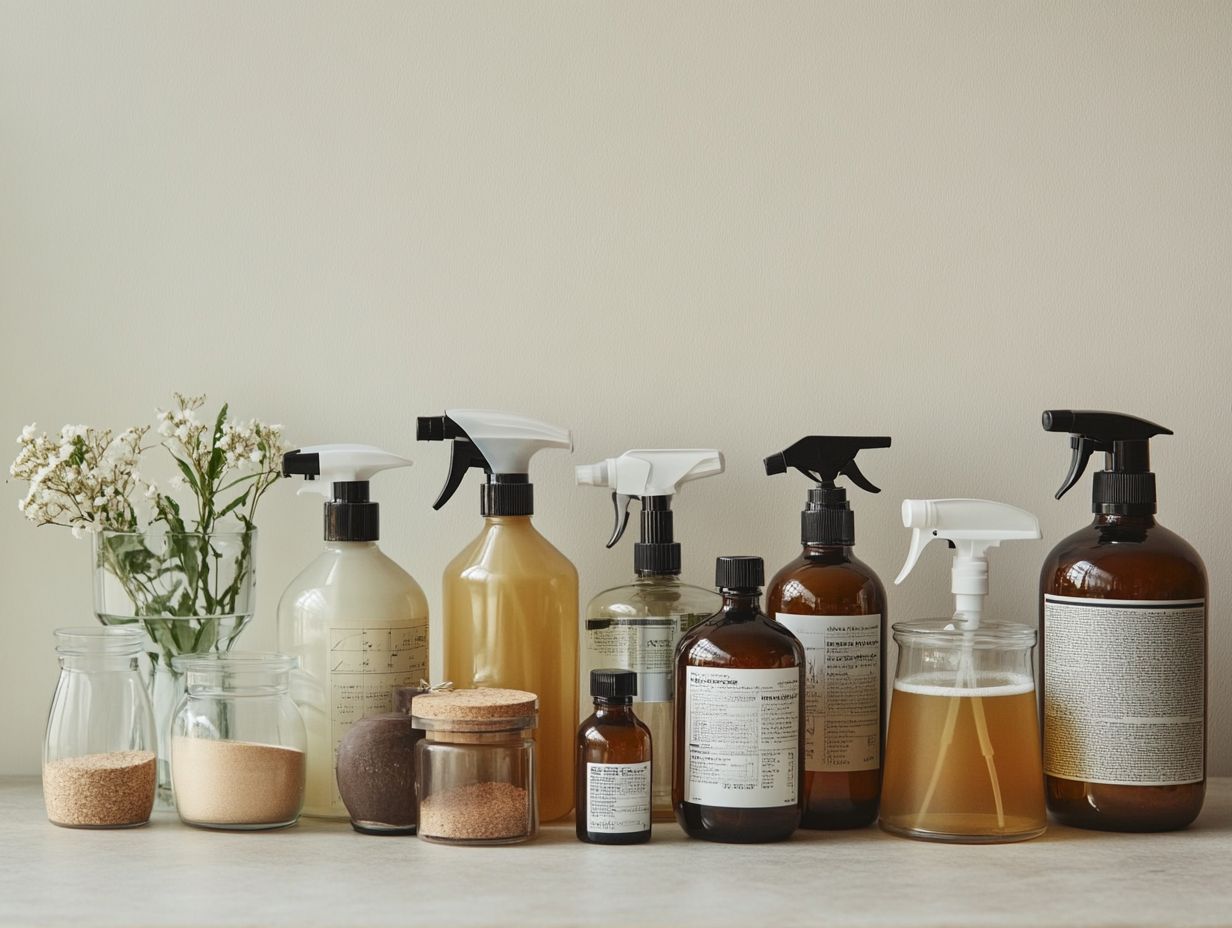
Glass containers are an exceptional choice for cleaners, thanks to their properties that prevent any unwanted chemical interactions. This means that the safety and effectiveness of your cleaning products remain uncompromised. Glass is also easy to clean and doesn t harbor bacteria, effectively addressing your hygiene concerns.
These containers truly shine when it comes to maintaining product integrity. Their impermeability to gases and moisture significantly reduces the risk of contamination, ensuring that what you use is as effective as it can be. Unlike plastic which can leach harmful chemicals over time glass keeps the composition of your cleaning agents intact, providing you with peace of mind.
Glass containers are also an elegant and eco-friendly alternative that enhances the aesthetic appeal of your storage spaces. Their ability to be sterilized and reused aligns perfectly with sustainable practices, making them a popular choice for consumers and manufacturers alike. Choosing glass is not just smart; it’s a game-changer for safety and style!
Advantages of Using Glass Containers for Cleaners
Using glass containers for your cleaners comes with a wealth of advantages that you ll surely appreciate, including their durability, aesthetic appeal, and enhanced organization. The transparency of glass lets you effortlessly identify the contents, while its sturdy design offers longevity, making it an excellent choice for storing both food and cleaning products.
These containers bring a sleek, modern look that can elevate the decor of any space, seamlessly blending functionality with style. The ability to see the contents at a glance not only helps you maintain an organized environment but also encourages effective use of supplies, significantly reducing the chances of duplication.
Many glass containers come equipped with airtight lids that help preserve the freshness of food items, enhancing their utility beyond mere storage. Whether you’re keeping leftovers or organizing craft supplies, the versatility of glass containers ensures they cater to various household needs, making them a critical part of contemporary living.
Disadvantages of Using Glass Containers for Cleaners
While glass containers undoubtedly offer numerous advantages, they also come with some drawbacks that you should consider, such as the risk of breakage, their heavier weight compared to plastic, and generally higher costs. These factors can limit their practicality, particularly for those in high-traffic environments.
For example, if you re worried about shattering, you might think twice about storing cleaning products in glass, especially if you have children or pets at home. Additionally, the initial investment for glass containers is typically higher than that of plastic alternatives, which can be a turn-off for budget-conscious shoppers like you.
Exploring alternatives like durable stainless steel or high-quality BPA-free plastics could provide a suitable compromise. These materials often deliver similar safety and environmental benefits while minimizing the risk of breakage and helping you save money. You might also consider utilizing refill stations or bulk purchasing options to help ease the financial burden associated with eco-friendly containers.
Metal Containers
You will find that metal containers are celebrated for their exceptional durability and strength, making them the prime choice for storing a variety of cleaning products and chemical substances.
They provide robust protection against external factors and chemical reactions, tailored specifically to accommodate different types of waste while ensuring safe handling and storage.
What Types of Metal Containers are Suitable for Cleaners?
You have a variety of metal containers at your disposal for storing cleaners, including drums, cans, and specially designed storage units tailored for chemical substances. These containers are meticulously engineered to comply with sanitation and waste disposal standards, ensuring that you practice safe storage.
Metal drums, for example, are ideal for bulk storage of industrial cleaners, offering robust protection against contamination while significantly minimizing the risk of leakage. Cans, on the other hand, cater to smaller operations or household needs, allowing for easy handling and precise dispensing of cleaning products. Specialized containers, equipped with features such as pressure relief valves and anti-corrosive coatings, play a crucial role in the management of hazardous chemicals.
By adhering to industry regulations, these metal solutions not only facilitate effective chemical use but also enhance workplace safety, reducing the likelihood of accidents and promoting responsible disposal practices for various cleaning substances.
Pros and Cons of Using Metal Containers for Cleaners
Using metal containers for cleaning products presents a range of advantages and disadvantages that you should consider. Their exceptional durability and corrosion resistance offer remarkable longevity, making them a strong contender in many settings.
However, you might find that metal containers tend to be heavier and pricier than their plastic counterparts, which could influence both usability and cost-effectiveness.
These factors are pivotal in deciding whether metal is suitable for your specific needs. For example, in industrial environments where cleaning chemicals are frequently utilized, the sturdiness of metal containers can prevent leaks and enhance safety, rendering them a preferred choice.
Conversely, for home use where portability is often a priority the weight of metal containers could pose a challenge.
From a financial perspective, while the upfront costs for metal may be steeper, their durability could lead to long-term savings for businesses that value reliability over time. Ultimately, understanding your specific requirements will guide you in determining whether metal containers are the right fit for your applications.
Choosing the Right Container for Your Specific Cleaner
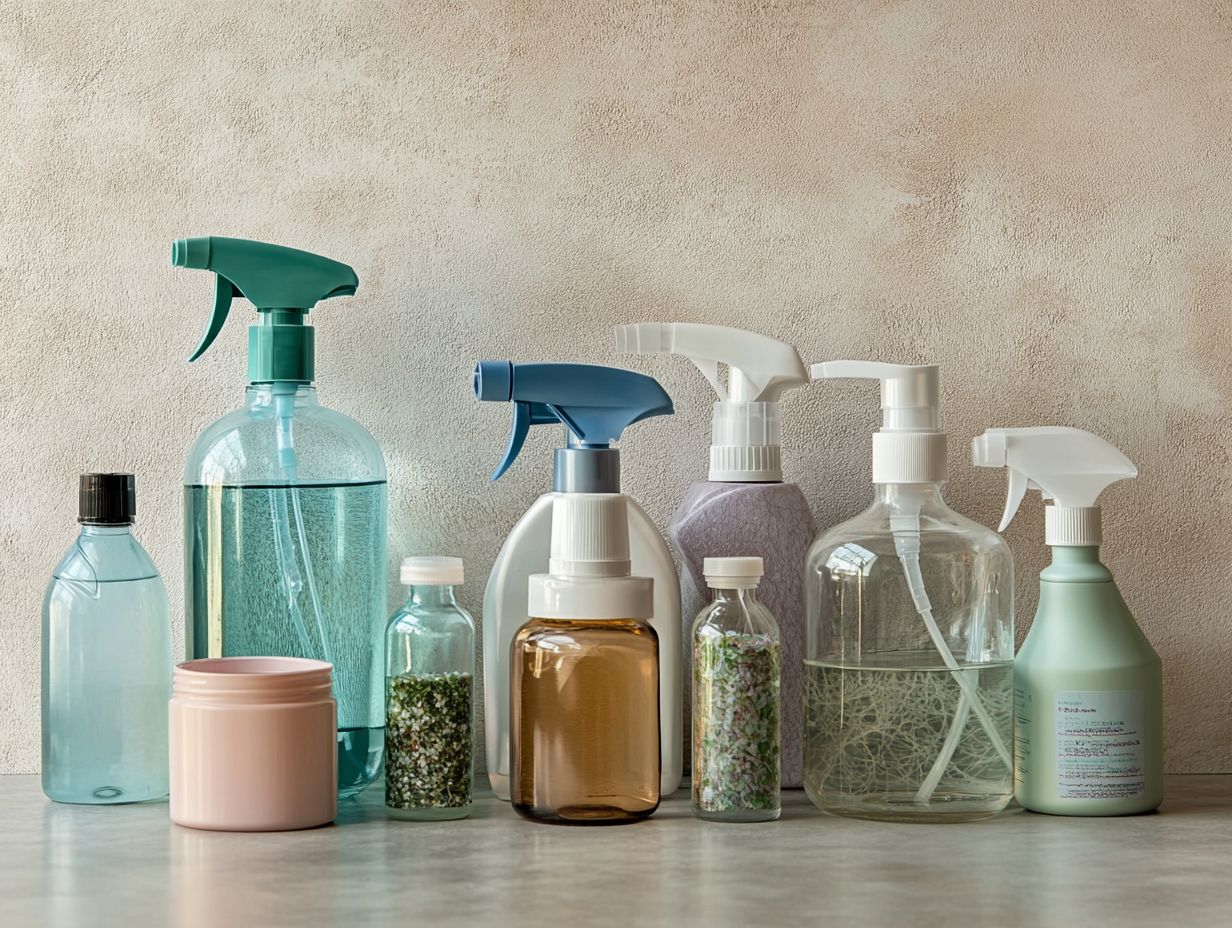
Selecting the appropriate container for your specific cleaner is crucial for maximizing effectiveness, ensuring safety, and maintaining organization.
You should carefully consider factors such as the compatibility of the container with the chemical, the ease of access it provides, and its capacity to preserve the integrity of the product throughout its use. Each of these elements plays a significant role in making the right choice.
Factors to Consider When Choosing a Container
Selecting a container for your cleaning products requires careful thought. Consider compatibility with chemicals, the container’s material, and safety features to prevent leaks.
Understanding the specific chemical composition of your cleaning solutions is crucial. Poor compatibility can cause dangerous reactions or even break down the container itself.
Prioritize safety features like childproof caps and spill-proof designs to minimize risks. By evaluating these factors, you’ll ensure your container preserves the integrity of your cleaning products and promotes safer handling.
Examples of Cleaners and Their Suitable Containers
Different types of cleaners require specific containers to ensure their effectiveness and safety. For instance, strong chemical cleaners are best suited for metal containers, while less reactive solutions can comfortably reside in plastic or glass containers.
This consideration is crucial, as the interaction between cleaning agents and their storage materials can significantly impact their performance and longevity. Bleaches and acidic cleaners, like vinegar, should ideally be stored in opaque containers to shield them from light exposure, which can lead to degradation.
Meanwhile, disinfectants thrive in airtight plastic bottles, preserving their potency over time. More delicate formulas, such as enzymatic cleaners, truly benefit from glass containers that are free from chemical leaching.
By understanding these distinctions, you can ensure optimal preservation and safety. It s essential to choose the right container that aligns with the specific chemical properties of the cleaner in question.
Proper Storage and Maintenance of Containers
Properly storing and maintaining your containers is essential for ensuring that your cleaning products remain effective and last as long as possible. By implementing best practices in sanitation and organization, you can preserve the integrity of the containers, preventing contamination and extending their usability.
Taking these measures not only keeps your cleaning supplies in top shape but also enhances your overall efficiency in maintaining a clean environment.
Tips for Properly Storing and Maintaining Containers
To store and maintain your containers effectively, adopt specific strategies that enhance organization and ensure sanitation. Start by labeling each container clearly and placing them in a cool, dry location away from direct sunlight.
Implementing a systematic labeling process will allow you to easily identify contents and expiration dates, reducing waste and facilitating efficient access. Regularly check your containers for wear and tear; inspect them for any cracks or leaks that could compromise the integrity of the stored items.
Elevating your containers off the ground whether in cabinets or on shelves not only protects them from moisture but also promotes airflow, which is especially important for food storage. Additionally, creating an inventory list can further streamline your organization efforts, ensuring that every container is accounted for and utilized effectively.
How to Clean and Reuse Containers
Cleaning and reusing containers is an excellent way to embrace sustainability. However, it’s essential to pay close attention to sanitation and safety.
Start by thoroughly rinsing out your containers. Use the right cleaning solutions to ensure all residues are eliminated.
To guarantee the safety of your reusable containers, it’s essential to know the materials they re made from be it glass, plastic, or metal. For plastic containers, steer clear of harsh chemicals that can break down the material.
A gentle dish soap combined with warm water works wonders for cleaning plastic containers.
Glass containers are durable and can handle rigorous cleaning. However, it s important to treat them with care to avoid breakage.
For metal containers, be diligent about drying them thoroughly to prevent rust. A quick wipe with a dry cloth after cleaning is a must.
Finish with a final rinse to wash away any soap residue. Consider sanitizing with a vinegar solution to effectively eliminate germs.
This simple step boosts safety and makes your cleaning routine more sustainable!
Frequently Asked Questions
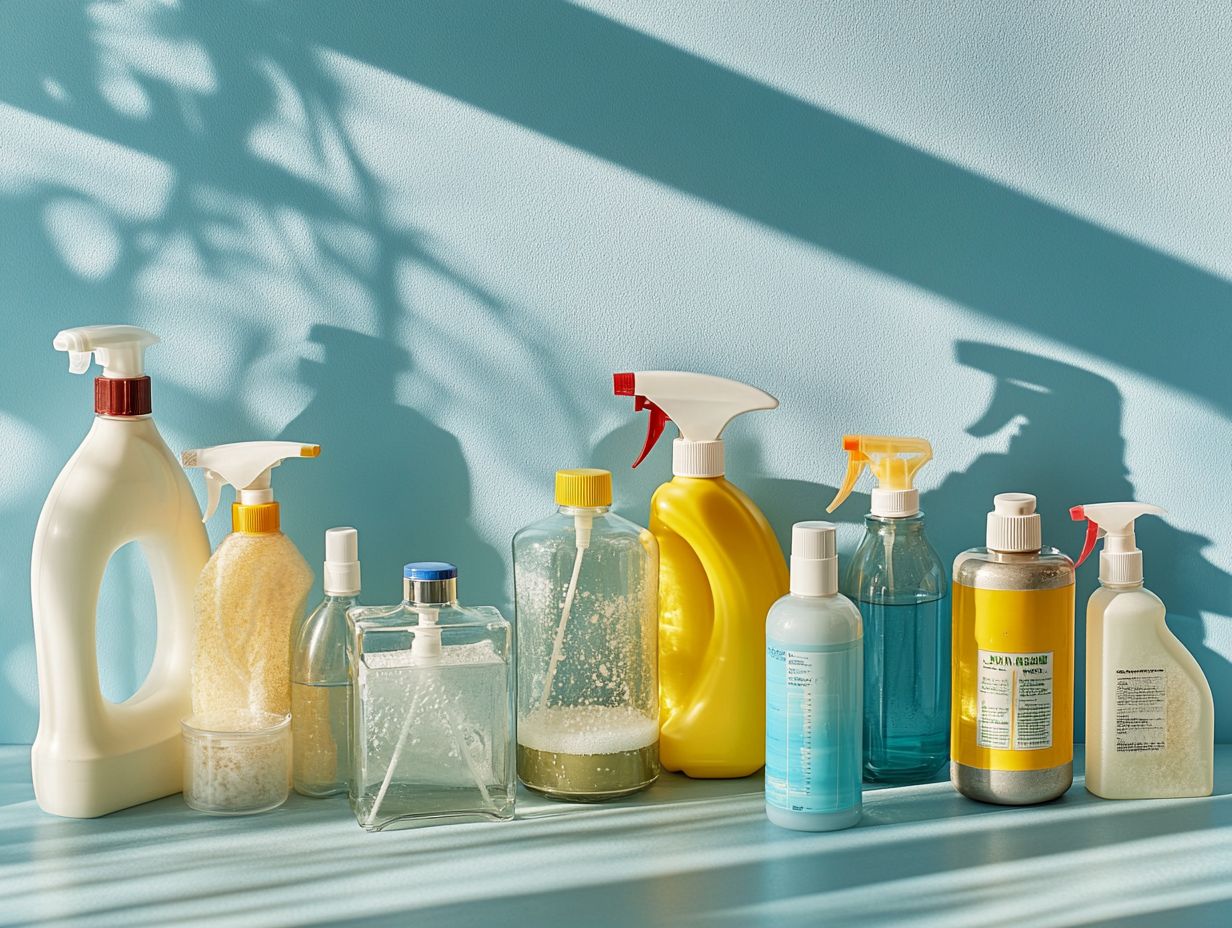
What factors should I consider when choosing the right containers for cleaners?
When choosing containers for cleaners, consider the type of cleaner, the size and shape of the container, the material, and the storage conditions.
What type of cleaner is best stored in a spray bottle?
Spray bottles are ideal for storing liquid cleaners, such as glass cleaners, all-purpose cleaners, and disinfectants.
Can I use any type of container to store my cleaners?
No, it is important to use containers specifically designed for storing cleaners. Using the wrong type of container can make the cleaner less effective or even pose a safety hazard.
What material is best for storing household chemicals and cleaning products?
Plastic containers are the most commonly used for storing cleaners. For stronger chemicals, use containers made of a strong type of plastic, like high-density polyethylene (HDPE) or polypropylene (PP), which are more resistant to chemical degradation and meet FDA regulations.
For added safety, consider using metal or glass containers for specific chemicals.
Is it important to label my cleaner containers for proper inventory management?
Yes, labeling your cleaner containers is crucial for safety and better organization. It helps identify the contents, any necessary safety precautions, and aids in inventory management, reducing the risk of product damage and worker injury.
How should I store my cleaner containers to comply with OSHA regulations?
Cleaner containers should be stored in a cool, dry place away from direct sunlight and heat sources. It is also important to store them out of reach of children and pets.
Consider using air-tight containers and stackable units to improve organization and prevent chemical degradation.
Start cleaning your containers today and share these tips with friends for a safer and more sustainable cleaning routine!

